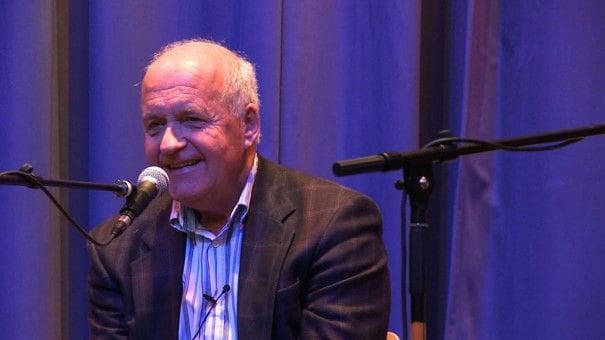“These trees which he plants, and under whose shade he shall never sit, he loves them for themselves, and for the sake of his children and his children’s children…” – Hyacinthe Loyson
The following obituary in memory of Götz Werner is written by his friend and guest contributor Enno Schmidt.
Götz Werner was the best-known and most influential proponent of unconditional basic income (UBI) in Germany. His presentation of the idea was also the basis for the Swiss vote on UBI in 2016 and many other activities of others in the UBI movement before and since. He passed away at the age of 78 on February 8th.
As a successful and multiple award-winning entrepreneur who founded the German drugstore chain dm, which employs 66,000 people with an annual revenue of over $14 billion, he brought the idea of UBI into the middle of society and into the whole of society. It was not only his status as an entrepreneur, but above all his authentic human-focused manner that inspired people.
His UBI advocacy was a logical consequence of his experience as an entrepreneur.
It was his belief that UBI did not at all contradict entrepreneurial success, business efficiency, social productivity and work, but was the precondition for it. “Your work,” he called out to an audience of a thousand in the large lecture hall at the University of Karlsruhe, “and the work we all do can never be paid for. But an income makes it possible.” He considered it misleading to distinguish between working time and free time. Because both are life time.
People spend their lifetimes in the companies they work for. “The company is a platform for biographies,” he said. It is there they develop their skills and unfold their lives. “People are never the means, they are always the purpose,” Götz believed. The human being is not a means to an end (purpose), but the end (purpose) of the company is the human being. And the goal of the human being is the generation of freedom.
It was in this spirit that Götz Werner ran his company. “Leadership is only legitimate if it is leadership for self-leadership,” he said. And so he did. If someone came into his office with one question, he left with three. “Answers put you to sleep, questions wake you up.” In the company’s branches, the staff decided to some extent for themselves what to put into consideration, whether to hire anyone else, what was good for the customers and their work. He believed in transparency. All employees at dm have access to all business data and the wages and salaries of their fellow employees.
“Turning those affected into those involved” was one of his slogans. “Suction instead of pressure” was his principle. Make something attractive, make it appealing, so that the employees and customers decide on their own whether they want to join in. After countless interviews with applicants, Götz Werner realized that people first need an income, then they can contribute work to the community. That is the order: first an income, then you are able to see how you can best contribute to a common goal.
The idea that work is paid dates back to chattel slavery. Because to pay for a lifetime is to buy people. Income is not payment, but enabling. That is the order for a free man. And everyone needs an income. That is quite independent of whether and what someone does in the work sense. “Work costs nothing. But everyone needs an income. “
For Götz Werner, all of this and much more was evidence from his work at dm. They were not beautiful ideals of management consultants. Making a profit was not a business objective for him. Profit was only necessary, like many other things, so that the company could still exist tomorrow and be there for the customers.
Götz Werner knew: “All people work. Even if they are unemployed they are doing something. All people want to contribute and do something for others if they see meaning in it and are shown appreciation.”
He also said, “Only with a UBI do we have a truly free labor market.” A market is defined by the freedom of market participants to say no to a bad job offer and to say yes to a task that seems worthwhile to them. In a society based on the division of labor, Götz Werner said, we all live from what others do for us. It is therefore reasonable to create the best conditions for the productivity of all. This is what UBI makes possible.
As a professor at the University of Karlsruhe, he explained to his students what characteristics an entrepreneur has: the will to change. What works well today must be changed in order to do well again tomorrow. Who wants to hold on to yesterday’s success will experience it as the obstacle tomorrow. Anticipation of need. And most important: “Human love and world interest.”
Götz Werner has given his shares in dm to a foundation. His son Christoph continues to run the company and has adopted one of his father’s mottos: “Who want, find ways; who don’t want, finds reasons.”
When his health began to deteriorate four years ago, he decided to pool his financial support for the ongoing global debate over UBI, and together with his wife Beatrice, to endow a professorship at the University of Freiburg. The Götz Werner professorship. The dm Götz Werner Foundation also now finances the work of the Freiburg Institute for Basic Income Studies, FRIBIS.
Once he told me about a letter he had received, the contents of which he found very correct. It read: “Unconditional basic income connects my liberal mind with my social heart.”





















